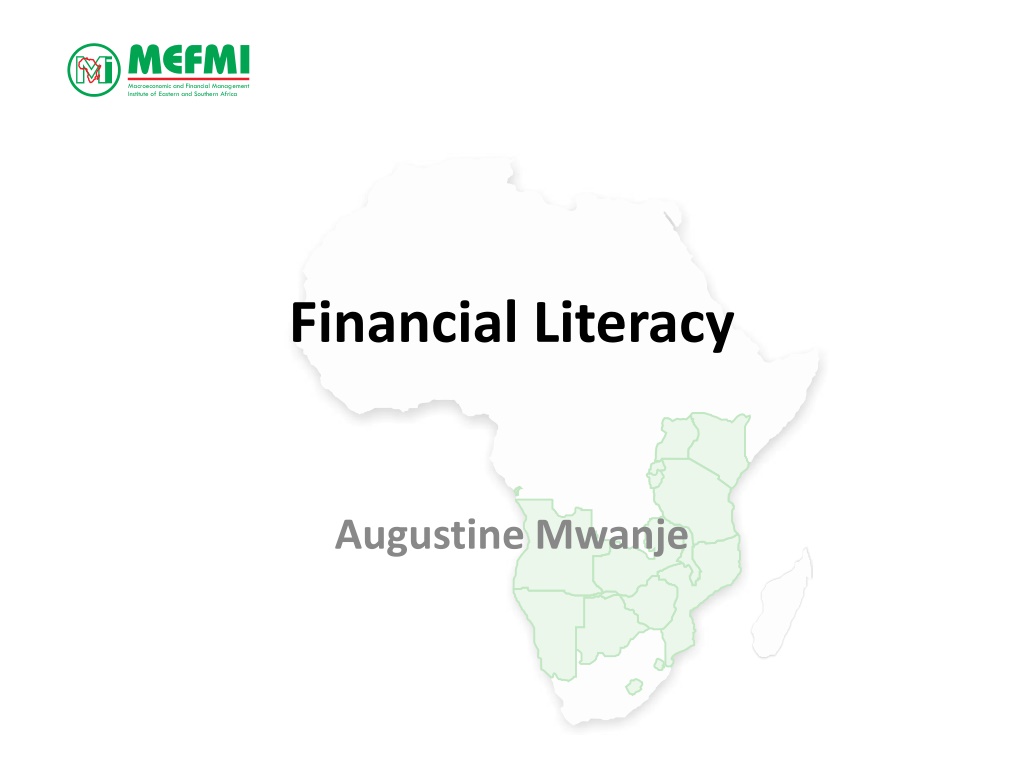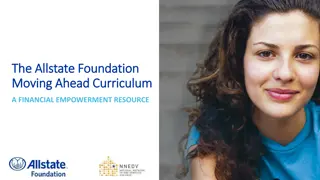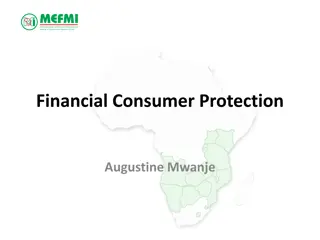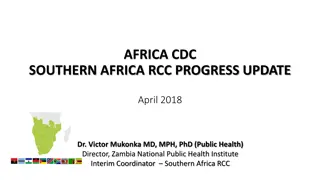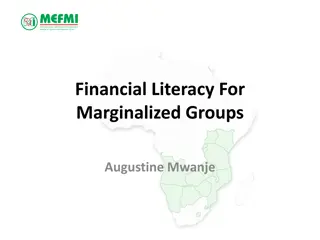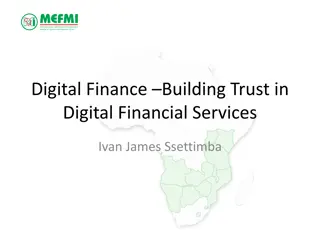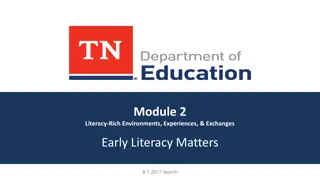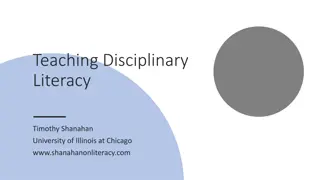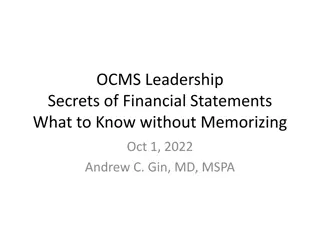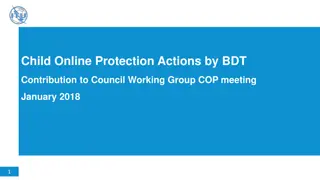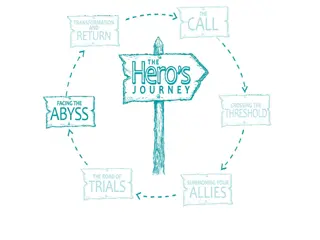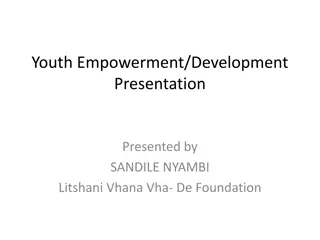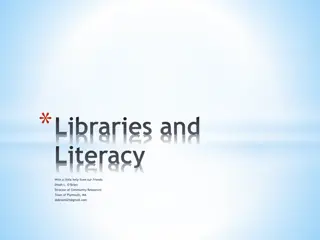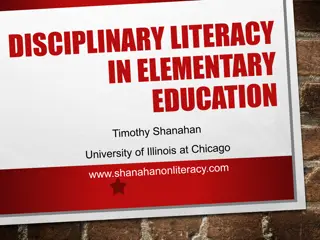Financial Literacy Empowerment in Eastern and Southern Africa
Developing countries in Eastern and Southern Africa are prioritizing financial education to empower consumers in making sound financial decisions. Financial literacy enhances financial inclusion, stability, and economic growth. It involves awareness, knowledge, skills, attitudes, and behaviors essential for individual financial well-being. Financial education aims to improve understanding of financial products and concepts, empowering individuals to manage risks, make informed choices, and enhance their financial well-being.
Download Presentation

Please find below an Image/Link to download the presentation.
The content on the website is provided AS IS for your information and personal use only. It may not be sold, licensed, or shared on other websites without obtaining consent from the author. Download presentation by click this link. If you encounter any issues during the download, it is possible that the publisher has removed the file from their server.
E N D
Presentation Transcript
Macroeconomic and Financial Management Institute of Eastern and Southern Africa Financial Literacy Augustine Mwanje
Macroeconomic and Financial Management Institute of Eastern and Southern Africa Agenda Introduction What Is Financial Literacy Why Is Financial Literacy Important Who Should Carry Out Financial Literacy How Should Financial Literacy Be Done Conclusion 2
Macroeconomic and Financial Management Institute of Eastern and Southern Africa Introduction Developing countries around the world are increasingly recognizing the importance of empowering consumers through financial education Financial literacy plays a critical role in the quest to achieve financial inclusion, financial stability, economic growth and development 3
Macroeconomic and Financial Management Institute of Eastern and Southern Africa What Is Financial Literacy? Definition A combination of awareness, knowledge, skill, attitude and behaviour necessary to make sound financial decisions and ultimately achieve individual financial wellbeing. Organisation for Economic Co-operation and Development (OECD) 4
Macroeconomic and Financial Management Institute of Eastern and Southern Africa What Is Financial Literacy? Definition Having the knowledge, skills and confidence to manage one's finances well, taking into account one's economic and social circumstances. Knowledge means having an understanding of personal financial issues; Skills means being able to apply that knowledge to manage one s personal finances; and Confidence means feeling sufficiently self-assured to make decisions relating to one s personal finances. 5
Macroeconomic and Financial Management Institute of Eastern and Southern Africa What Is Financial Literacy? Financial Education Financial education is the process by which financial consumers/investors improve their understanding of financial products and concepts and, through information, instruction and/or objective advice, develop the skills and confidence to become more aware of financial risks and opportunities, to make informed choices, to know where to go for help, and to take other effective actions to improve their financial well-being. - OECD 6
Macroeconomic and Financial Management Institute of Eastern and Southern Africa What Is Financial Literacy? Financial Education (cont d) Informationinvolves providing consumers with facts, data and specific knowledge to make them aware of financial opportunities, choices and consequences; Instruction involves ensuring that individuals acquire the skills and ability to understand financial terms and concepts, through the provision of training and guidance; and Adviceinvolves providing consumers with counsel about generic financial issues and products so that they can make the best use of the financial information and instruction they have received. 7
Macroeconomic and Financial Management Institute of Eastern and Southern Africa What Is Financial Literacy? Financial Capability Encompasses financial literacy and reflects the multiple dimensions of Knowledge, Skills, Attitudes, Confidence and Behaviour. The ability to apply (that) knowledge, to make informed decisions, and to take effective actions regarding the current and future management of money. 8
Macroeconomic and Financial Management Institute of Eastern and Southern Africa Why Is Financial Literacy Important? Financial literacy is an essential requirement for consumer protection in the financial sector as it creates better awareness and understanding of financial products, prices, and practices. It is relevant for everyone in a modern society regardless of income level, education, age, gender or whether they are in a rural or urban setting 9
Macroeconomic and Financial Management Institute of Eastern and Southern Africa Why Is Financial Literacy Important? Acquiring the knowledge, skill and confidence to earn, save, invest and borrow money responsibly is vital step towards financial inclusion. The successful implementation of a financial literacy program can have a significant impact on the economic growth and development of a nation. A more financially literate population empowered and equipped to make prudent choices on their personal finances. 10
Macroeconomic and Financial Management Institute of Eastern and Southern Africa Why Is Financial Literacy Important? Micro Level: Improves the ability of the population to manage their personal finances well Helps people to protect themselves against financial fraud Helps people make informed choices between different financial products and services Helps people understand their rights and responsibilities as consumers of financial products 11
Macroeconomic and Financial Management Institute of Eastern and Southern Africa Why Is Financial Literacy Important? Macro Level: The behaviour of financially capable consumers creates competition amongst financial service providers leading to better and competitive financial products Non-Performing Assets are a leading cause of failure of Financial institutions, and these can be reduced by matching the right credit products to the market Financial literacy combined with an effective consumer protection framework increases financial intermediation 12
Macroeconomic and Financial Management Institute of Eastern and Southern Africa Who Should Carry Out Financial Literacy? Financial literacy can be improved through a deliberate national strategy that encompasses financial education, information, instruction, training and advice. Financial literacy, financial consumer protection, prudential regulation and financial inclusion initiatives are complementary to one another, so the Central Bank s role is vital. 13
Macroeconomic and Financial Management Institute of Eastern and Southern Africa Who Should Carry Out Financial Literacy? Improving the financial literacy of the population is a challenge which no single organization can achieve on its own. Financial literacy initiatives are therefore developed through a consultative process among the key stakeholders (government, regulators, the industry, and consumer associations) and approved by a government body as part of the national financial inclusion strategy. 14
Macroeconomic and Financial Management Institute of Eastern and Southern Africa How Should Financial Literacy Be Done? There is no one-size-fits-all approach to a financial literacy strategy, and therefore matching the content of financial education to the target group is essential to making it relevant. Target groups for financial education can be defined by age, gender, employment status, or relationship to a specific financial product. 15
Macroeconomic and Financial Management Institute of Eastern and Southern Africa How Should Financial Literacy Be Done? A set of core messages needs to be developed for use in financial literacy initiatives, and these should be based on feedback both from stakeholders and focus group discussions. The core messages are intended to be clear and simple statements that prompt people to take action. 16
Macroeconomic and Financial Management Institute of Eastern and Southern Africa How Should Financial Literacy Be Done? The Core messages can be grouped under the following headings: Personal Financial Management Savings Loans Investments Insurance Planning for Old Age Making Payments Financial Service Providers 17
Macroeconomic and Financial Management Institute of Eastern and Southern Africa How Should Financial Literacy Be Done? Segmenting the target groups improves the message to market match and facilitates the development of strategic priority activities Based on consultation with stakeholders, the strategy can focus on the following strands: Schools Youth Rural outreach Workplace Media 18
Macroeconomic and Financial Management Institute of Eastern and Southern Africa How Should Financial Literacy Be Done? The implementation of a financial literacy strategy encompasses a broad range of activities including: Training of Trainers for Financial Literacy National Stakeholder Meetings Incorporation of Financial Literacy into the School Curriculum Development of Financial Literacy Awareness Tools and Awareness Campaigns It is also important to monitor and evaluate the impact of initiatives implemented, in addition to reviewing and refining action plans. 19
Macroeconomic and Financial Management Institute of Eastern and Southern Africa How Should Financial Literacy Be Done? Given the broad range of stakeholders, there is a need to map, manage and co-ordinate their efforts to avoid duplication, and ensure that a consistent message is being communicated to the population. The Central Bank should take the lead, given that it is influential, widely respected, has a legal mandate and has a track record of leading other major initiatives in the field of financial services. 20
Macroeconomic and Financial Management Institute of Eastern and Southern Africa Conclusion A more financially literate population empowered and equipped to make prudent choices on their personal finances can contribute to the economic growth and development of a nation An educated consumer is a regulator s best friend 21
Macroeconomic and Financial Management Institute of Eastern and Southern Africa Thank You Any Questions? 22
Macroeconomic and Financial Management Institute of Eastern and Southern Africa References and Bibliography Towards an Effective Framework for Financial Literacy and Financial Consumer Protection in Uganda (GIZ & Bank of Uganda, March 2011) Strategy for Financial Literacy in Uganda (Bank of Uganda, August 2013) National Financial Literacy Framework (Central Bank of Nigeria, October 2015) Ledgerwood, Joanna, with Julie Earne and Candace Nelson, eds. 2013. The New Microfinance Handbook: A Financial Market System Perspective. Washington, DC: World Bank. doi: 10.1596/978-0-8213-8927-0.License: Creative Commons Attribution CC BY 3.0 23
